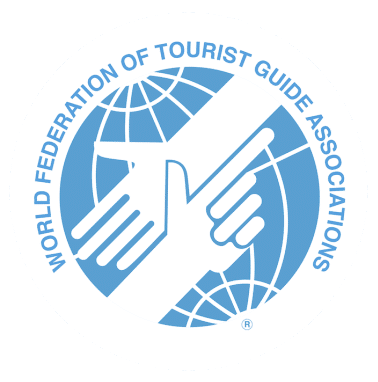A professional Tourist Guide is a trained and qualified cultural mediator who interprets the natural and cultural heritage of a place for visitors. Around the world, the requirements to work as a Tourist Guide differ greatly: in some countries the profession is fully regulated by law, in others only partially regulated, and in many places it remains entirely unregulated.
The WFTGA advocates for clear minimum standards in training and qualification so that visitors, communities and guides themselves can rely on quality, safety and ethical practice. Where regulation exists, we encourage Tourist Guides to meet the official national requirements. Where there is no regulation, we work with associations, institutions and authorities to develop professional structures, training and recognition.

Our vision is that every Tourist Guide in the world should:
- receive structured training before guiding,
- be assessed and recognised through a transparent qualification process,
- follow a clear Code of Practice and Code of Conduct,
- have access to continuous professional development, and
- work within a framework that respects heritage, communities and sustainability.
We support diversity in local approaches – each country has its own history, markets and legal system – but we believe some elements should be universal:
- solid knowledge of history, culture, environment and contemporary life;
- strong guiding techniques and communication skills;
- understanding of group management, safety and risk;
- professional ethics: respect, inclusivity, non-discrimination and integrity.
To this end, WFTGA promotes minimum training standards based on internationally recognised frameworks, particularly the European Standard EN 15565, and adapts them to different regional realities.
N 15565:2008 “Tourism Services – Requirements for the provision of professional tourist guide training and qualification programmes” is a European standard developed by CEN (the European Committee for Standardization). Although created for Europe, it has become a global benchmark for high-quality Tourist Guide training.
WFTGA has adopted the content of EN 15565 as the minimum standard for accrediting Tourist Guide Training Programmes worldwide. This means that, when we support or accredit a course, we look for:
- clearly defined learning outcomes for knowledge, skills and attitudes;
- a balanced mix of theoretical modules and practical training (classroom, site, city, coach, countryside, etc.);
- transparent assessment methods, including written, oral and practical exams;
- sufficient training hours and field practice to prepare guides for real tours;
- competent trainers, who are themselves qualified and experienced Tourist Guides;
- quality assurance, feedback and opportunities for continuous development.
EN 15565 also underpins our flagship Hands On Guiding course, which includes a two-day Communication Seminar and practical training and assessment on site, on walks and on moving vehicles.
By supporting EN 15565, WFTGA does not argue for a single global system, but rather for a shared quality frameworkthat can be adapted to local contexts and legislation.
Since 1996, the WFTGA has designed and delivered specialised courses for Tourist Guides and for Trainers of Tourist Guides all over the world. These have been organised in cooperation with:
- national and regional Tourist Guide Associations,
- ministries responsible for tourism, culture and education,
- UN Tourism (formerly UNWTO), UNESCO and other agencies.
Our Main Training Offers
Hands On Guiding (HOG)
Practical skills course based on EN 15565, combining a Communication Seminar with intensive fieldwork and assessment on coach, on foot and on site.
Train the Trainer Courses
These courses prepare experienced guides to plan, deliver and assess training in line with WFTGA and EN 15565 standards.
Short Courses & Seminars
On professional guiding skills, heritage interpretation, communication & presentation, safety, digital tools, customer care and more.
All WFTGA trainers are qualified, practising Tourist Guides who have completed our trainer pathway.
Accreditation & Support
Where associations, institutions or authorities wish to establish or upgrade their Tourist Guide training programmes, WFTGA can:
- advise on curriculum design aligned with EN 15565;
- assist with programme accreditation;
- provide external examiners and quality review;
- support the development of continuous professional development (CPD/CMD) schemes.
For enquiries, associations are invited to contact the WFTGA Secretariat.
The status of the Tourist Guide profession varies widely. Based on WFTGA research, the profession can broadly be grouped into three categories:
1. Fully Regulated Profession
In these countries or regions, Tourist Guiding is a protected profession:
- The law requires specific qualifications and licences to guide legally.
- There is usually formal training, language requirements, exams and a licence.
- Guides are officially registered and supervision is carried out by a ministry or public authority.
- Examples include: Greece, Cyprus, Italy, Malta, Austria, Iceland, many regions of Spain, parts of the Middle East and Asia, and some cities in North and Latin America.
In this context, “illegal guides” are people who guide without the required licence or qualification, in breach of the law.
2. Partially Regulated Profession
Here, some elements of regulation exist, but not all:
- Guides may be licensed and registered, but formal state training may be missing.
- Sometimes a university degree or exams are required instead of dedicated guide training.
- Regulatory practices may differ between regions within the same country.
3. Unregulated Profession
In unregulated systems:
- Anyone can guide, and there is no legal requirement for training, exams or licences.
- Some non-governmental bodies or associations may offer voluntary training and certification, badges or accreditation.
- This can create a mix of highly qualified guides and untrained individuals operating side by side.
Our Role
WFTGA works with associations, authorities and partners across all three categories to:
- promote regulation and recognition where none exists;
- raise standards where systems are partial or outdated;
- support training and accreditation for both guides and trainers;
- advocate for policies that protect heritage, visitors and the profession.
On this page, we suggest integrating an interactive world map that uses colour coding to show:
- countries/regions where the profession is fully regulated,
- those where it is partially regulated, and
- those where it is unregulated, with optional layers indicating where official or voluntary training and licensing exist.
This will allow visitors to quickly understand the global picture and recognise the diversity – and the gaps – in Tourist Guide regulation worldwide.

